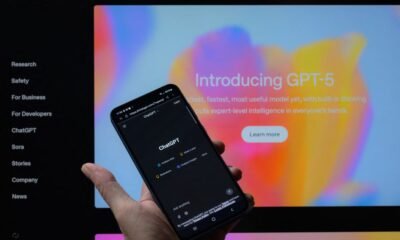Business
ServiceNow Q2 earnings show AI momentum as company announces ‘Agentic Workforce Management’ product
ServiceNow reports Q2 2025 subscription revenues of $3.113 billion, representing 22.5% year-over-year growth and beating the high end of guidance – and analyst expectations – as Artificial Intelligence (AI)-powered solutions increasingly drive large customer deals. The results, announced today alongside a new ‘Agentic Workforce Management’ product, reflect the company’s ambition to become the ‘central orchestration layer’ for enterprise AI.
Current remaining performance obligations (cRPO) reached $10.92 billion, growing 24.5% year-over-year and exceeding expectations. The company sees 89 transactions over $1 million in net new Annual Contract Value (ACV) in Q2, while 528 customers now generate more than $5 million in ACV – up 19.5% year-over-year. The number of customers with more than $20 million in ACV grows over 30%.
Undeniably an excellent set of results. CEO Bill McDermott says:
ServiceNow’s outstanding second quarter results continue our long track record of elite level execution. Every business process in every industry is being refactored for agentic AI. ServiceNow has never been more differentiated as a full stack agentic operating system for the enterprise.
The quarterly performance supports the aggressive market positioning McDermott outlines at Knowledge 2025, where he declares that enterprise customers are actively seeking to eliminate underperforming software vendors from their technology stacks.
The strong financial results also reflect growing customer adoption of ServiceNow’s AI capabilities. In a pre-earnings interview, Amit Zavery, ServiceNow’s President, Chief Product and Operating Officer, attributes the momentum to enterprises seeking proven AI implementations rather than experimental approaches. Zavery explains:
AI is top of mind for pretty much every enterprise company out there. A lot of them are looking for guidance and technology that works. With our experience doing this work for a long time at the enterprise level, a lot of customers appreciate our expertise in this area.
Zavery explains that ServiceNow’s cross-functional platform gives it credibility in AI discussions with senior executives:
When we talk to the C-suite, Chief Information Officers (CIOs), technology teams, and line of business, they look at our breadth of capabilities as well as real-world implementation, and that gets us on the top of the list for them to work with.
The company’s positioning, with what Zavery calls an “enterprise OS”, appears to be resonating:
We have a pretty large business with enterprise companies as well as different organizations and government agencies. In follow-up conversations, when they’re thinking of AI, they’re reaching out and saying, ‘What does ServiceNow think? What should we do? How should we approach this, and what kind of use cases can we work on?’
This consultative approach translates into implementations that demonstrate measurable value. Zavery notes:
You’re starting to see a lot of these AI use cases getting live and creating value. We can approach this problem in many ways because of the breadth of things we do across the enterprise – we touch every part of the business and connect many things together as an enterprise OS.
Data integration becomes strategic
A notable development in Q2 is the prominence of ServiceNow’s Workflow Data Fabric in 17 of the company’s top 20 deals, reflecting how buyers see AI implementation requiring comprehensive data access across enterprise systems (again, a key ServiceNow proposition since the early days). Zavery explains that Workflow Data Fabric addresses a fundamental challenge in AI deployments:
You want to automate business processes and connect various things together, but to get the most value out of AI use cases, especially agentic use cases, you have a lot of dependency on data. Data in every enterprise is fragmented in various data silos.
ServiceNow’s approach uses what Zavery describes as a “zero-copy architecture” that avoids the complexity of traditional data integration projects. He adds:
The Workflow Data Fabric message resonates as technology that solves the problem of getting value out of data into business processes and workflows, without having to do a lot of restructuring and moving things around.
The platform connects to major data sources including Snowflake, Databricks, Oracle, Teradata, BigQuery, and Redshift. Zavery explains:
Our ecosystem works with any data, and that helps us get better value from AI. It’s becoming more combined in our conversations, and customers are starting to want to use Workflow Data Fabric to solve other problems while also implementing AI capabilities.
Agentic Workforce Management
ServiceNow also announces its new Agentic Workforce Management tool today, which is described as an extension of its AI agent orchestration capabilities, with the aim being to allow employees and AI agents to work together on complex tasks. The product represents the next phase of ServiceNow’s AI strategy, moving beyond individual agents to ‘coordinated digital workforces’.
Zavery outlines the multi-layered approach ServiceNow takes to agentic AI:
There are multiple things happening with agentic AI. There’s the need for an agentic platform, which is part of our AI platform capabilities – not just AI agents, but connectivity between various AI agents, with the ability to orchestrate, reason, and plan with, not just ours, but third-party AI agents as well.
The company’s AI Control Tower provides lifecycle management including “security, risk, compliance, evolution, and ensuring agents are doing the right things with expected outcomes and control across your enterprise.”
The new Agentic Workforce Management layer addresses what Zavery calls the ‘operational complexity’ of managing digital workers:
Many companies are also asking, ‘Can I use these AI agents to create a digital workforce?’ When you bind agents together with the ability to run and operate work instead of humans doing all those tasks, that becomes complicated to manage. How do you manage this hybrid of humans with digital workers in a thoughtful way?
ServiceNow already implements the technology internally with measurable results. The company has automated 97% of software provisioning requests while reducing service desk volume by nearly 40%. Internal IT support sees 85% of routine requests resolved autonomously, helping the department scale by more than 40%.
Customer support operations show similar results, with the agentic workforce resolving 80% of complex instance administration cases and achieving 50% faster resolution times.
Enterprise architecture transformation
The Q2 results come as ServiceNow pushes a broader thesis about enterprise software consolidation driven by AI requirements. Zavery acknowledges that this transformation is in its infancy but sees clear momentum:
Customers are in the early stage of re-evaluating their underlying legacy systems. Enterprises have always wanted to modernize, but they’re rarely able to completely transition to something modern over many years. AI is one driving factor making customers think, ‘Maybe I should rethink how I build my stack.’
This shift toward what Zavery calls an “agentic AI stack” represents a departure from traditional siloed enterprise architecture:
Many companies we speak to are moving systems into more modern data sources while moving user experiences away from legacy systems. A lot is happening at the business workflow level versus the siloed, stack-to-stack mindset people were using.
ServiceNow’s value proposition centers on bridging existing systems during this transformation. Zavery adds:
When we come in and say we’ll rewire your business processes, make them flexible and agile, and give you the ability to evolve quickly across existing systems, it resonates. Once it resonates, customers start thinking about whether to shut down some pieces or consolidate parts of their legacy architecture while modernizing.
The approach appears to be generating both operational savings and strategic value:
It doesn’t just save money through automation, but they can modernize and make their businesses much more agile than the architectures they’ve had for many years.
Market understanding and positioning
When asked about market perception of ServiceNow’s growth potential, Zavery suggests that investors are still developing their understanding of the company’s expanded scope. With a smile on his face, he comments:
The market is still figuring out what ServiceNow does. It’s interesting for them to understand because we run enterprise operating systems for business processes and workflows, which are hard to put in a box.
This positioning challenge reflects ServiceNow’s evolution beyond its traditional categories.
We’re doing many different things to help businesses, versus traditional businesses that fit in specific segments. We’re in a much broader segment now.
Zavery expects market understanding to evolve as AI implementations demonstrate measurable business impact:
Agentic AI is real – and you can see the results – people will start realizing there’s a transformation happening, and ServiceNow will be a major player in that transformation.
My take
ServiceNow’s Q2 results show the company successfully monetizes its AI platform strategy, with strong revenue growth driven by customer adoption of AI products like Now Assist and Workflow Data Fabric. The launch of agentic workforce management demonstrates ServiceNow’s evolution from workflow automation to AI orchestration.
The key test will be whether ServiceNow can sustain this momentum while carrying out complex enterprise AI implementations at scale. The company’s unified platform architecture and cross-functional reach provide advantages, but translating McDermott’s ambitious consolidation vision into sustained market share will require multi-year, ambitious execution. That being said, I think ServiceNow has surprised many with its successful expansion in recent years.
As Zavery notes:
We continue to see momentum and customer interest, and as long as we keep executing, we should see the growth we’ve seen so far.
Business
CrowdStrike and Salesforce Partner to Secure the Future of AI-Powered Business

CrowdStrike and Salesforce announced a new strategic partnership to enhance the security of AI agents and applications built on Agentforce and the Salesforce Platform. Through integrations between CrowdStrike Falcon®? Shield and Salesforce Security Center, Salesforce admins and security professionals will gain enhanced visibility, compliance support, and protection for mission-critical workflows – simplifying operations and uniting business and security teams on a shared foundation of trust in the agentic era.
The partnership also enables customers to access CrowdStrike’s agentic security analyst, Charlotte AI, through Agentforce for Security and use it to work directly alongside teammates in Slack, flagging potential threats and recommending actions in a conversational manner as any other employee would. As agents join the workforce, security teams must understand what they are doing, trace them back to their human creators, and prevent them from becoming over privileged or compromised. CrowdStrike and Salesforce are meeting this challenge by delivering the visibility and control needed to secure the future of AI-powered business.
Automatic Threat Containment: Automate response actions with Falcon®? Fusion – such as blocking risky access or disabling compromised agents – directly from Salesforce Security Center. Unified AI Agent Protection: Combine Falcon Shield, Falcon®?
Next-Gen Identity Security, and Falcon®? Cloud Security to deliver end-to-end control over Agentforce agents and applications. By bringing Charlotte AI into Slack through Agentforce for Security, CrowdStrike and Salesforce empower teams to quickly and efficiently handle security incidents without having to switch applications: Accelerated Incident Response: Instantly create dedicated incident channels in Slack to coordinate response; Conversational Threat Investigation: Use natural language to query Charlotte AI for immediate answers on threats, hosts, and data; Real-Time Remediation: Isolate compromised devices or take other response actions directly from Slack, ensuring swift containment.
Together, CrowdStrike and Salesforce deliver stronger protection and visibility for mission-critical workflows- enabling enterprises to embrace AI securely while building the foundation for future innovation. Availability: The Falcon Shield integration will be available from within the Salesforce Security Center and on the Salesforce AppExchange this year; Charlotte AI will be integrating into Slack via Agentforce for Security and available via the AgentExchange and Slack Marketplace this year.
Business
Workday Signs Definitive Agreement to Acquire Sana

Acquisition to Turn Workday into the New Front Door for Work
Acquisition Will Combine Sana’s AI-Powered Search, Agents, and Learning with Workday Context and Data to Power Proactive, Personalized, and Intelligent Employee Experiences
SAN FRANCISCO, Sept. 16, 2025 /PRNewswire/ — Workday Rising 2025 — Workday, Inc. (NASDAQ: WDAY), the enterprise AI platform for managing people, money, and agents, has entered into a definitive agreement to acquire Sana, a leading AI company building the next generation of enterprise knowledge tools. Sana will power a new Workday experience—where knowledge, data, action, and learning come together as one and create the new front door for work.
Since its founding in 2016, Sana has been at the forefront of AI for work, developing intuitive tools that elevate humans with AI. Sana’s core products, Sana Learn and Sana Agents, have already served over one million users across hundreds of enterprises.
In addition to powering a new Workday experience, Sana will continue to develop Sana Learn and Sana Agents. As part of Workday, Sana will be able to accelerate its growth and deliver even more innovation to its customers at scale.
“Sana’s team, AI-native approach, and beautiful design perfectly align with our vision to reimagine the future of work,” said Gerrit Kazmaier, president, product and technology, Workday. “This will make Workday the new front door for work, delivering a proactive, personalized, and intelligent experience that unlocks unmatched AI capabilities for the workplace.”
“Our focus has always been on creating intuitive AI tools that improve how people learn and work,” said Joel Hellermark, founder and CEO of Sana. “I’m excited to bring these tools to 75 million Workday users and partner with Workday’s iconic team to launch a new era of superintelligence for work.”
The New Front Door for Work: A Reimagined Workday Experience
With Sana, Workday will create the work experience of the future, where enterprise knowledge, data and actions converge into one. This will help people get their work done and empower employees with AI agents that can:
- Find answers, information and files by instantly searching across a company’s most critical data sources, including Workday, Google Drive, SharePoint, and Office365.
- Act proactively by anticipating needs, summarizing insights, and assisting with projects.
- Create presentations, documents, and dashboards, even full learning courses, based on company knowledge.
- Automate repetitive tasks and routine work by executing workflows end-to-end.
Leveraging Workday’s unique data and context around people and money—as well as a rich ecosystem of builders and partners—the employee experience will become personalized and proactive, better anticipating employee needs based on their role, team, and projects. For example, hiring managers will be able to generate tailored dashboards to monitor their live recruitment pipeline, automate the end-to-end performance review process, and receive proactive suggestions on onboarding new hires based on real-time performance data.
Unlocking a New Era of Enterprise AI
Sana Agents extends enterprise AI beyond basic search and chat. With the platform’s no-code agent builder, users can create AI agents to automate repetitive tasks and act proactively on their behalf. These agents streamline workflows while helping ensure that every action remains secure and compliant with company policies through the Workday Agent System of Record.
Existing customers are realizing significant tangible value from Sana Agents across various use cases. For instance, a leading American manufacturer achieved up to 95% time savings; a multinational industrial tech company achieved 90% productivity gains; and a global law firm saw over 60% time savings and 200% increased efficiency.
Elevating Talent Development with AI-Powered Learning
Sana is also a pioneer in applying AI to learning. Its AI-native learning platform, Sana Learn, combines learning management, content creation, course generation, and personalized tutoring through specialized learning agents. Sana Learn has already enabled hundreds of customers across industries to accelerate learning. For example, a global electric vehicle manufacturer boosted learning engagement by 275%; a leading European installation distributor with 7,500 employees cut course creation time from four months to four days; and a global fintech company went from three weeks to three hours for content creation.
Sana Learn will complement Workday Learning with hyper-personalized skill building capabilities and AI-native content creation at scale. Enhanced by AI-driven internal mobility with Workday Talent Optimization and HiredScore, this comprehensive learning suite will help employees build skills faster and help enable organizations to scale personalized learning experiences, supporting employee reskilling and upskilling initiatives.
“Sana pioneered the world of intelligent agents and AI-native learning at scale,” said Josh Bersin, global industry analyst and CEO of The Josh Bersin Company and a Sana customer. “I think Sana’s AI agent and learning system gives Workday customers the opportunity to completely transform the way their employees learn, grow, and operate as super workers in this new age of AI.”
Details Regarding Proposed Acquisition of Sana
Under the terms of the definitive agreement, Workday will acquire all of the outstanding shares of Sana for approximately $1.1 billion.
The transaction is expected to close in the fourth quarter of Workday’s fiscal year 2026, ending January 31, 2026, subject to the satisfaction of customary closing conditions. Allen & Company LLC is serving as financial advisor to Workday and Orrick is serving as its legal advisor. DLA Piper is serving as Sana’s legal advisor.
About Workday
Workday is the enterprise AI platform for managing people, money, and agents. Workday unifies HR and Finance on one intelligent platform with AI at the core to empower people at every level with the clarity, confidence, and insights they need to adapt quickly, make better decisions, and deliver outcomes that matter. Workday is used by more than 11,000 organizations around the world and across industries – from medium-sized businesses to more than 65% of the Fortune 500. For more information about Workday, visit workday.com.
About Sana
Sana is an AI company building the next generation of knowledge tools. Its products have served over a million users globally and are trusted by the likes of Merck and Polestar. To learn more about Sana, visit sanalabs.com.
Forward-Looking Statements
This press release contains forward-looking statements related to Workday, Sana, and the acquisition of Sana by Workday. These forward-looking statements are based only on currently available information and Workday’s current beliefs, expectations, and assumptions. Because forward-looking statements relate to the future, they are subject to risks, uncertainties, assumptions, and changes in circumstances that are difficult to predict and many of which are outside of our control. If the risks materialize, assumptions prove incorrect, or we experience unexpected changes in circumstances, actual results could differ materially from the results implied by these forward-looking statements, and therefore you should not rely on any forward-looking statements. Forward looking statements in this communication include, among other things, statements about the potential benefits and effects of the proposed transaction; Workday’s plans, objectives, expectations, and intentions with respect to Sana’s business; and the anticipated timing of closing of the proposed transaction. Risks include, but are not limited to: (i) the risk that the transaction may not be completed in a timely manner or at all; (ii) failure to achieve the expected benefits of the transaction; (iii) Workday’s ability to deliver a new Workday experience, accelerate Sana’s growth, and implement its other plans, objectives, and expectations with respect to Sana’s business and technology; (iv) negative effects of the announcement or the consummation of the transaction on Workday’s business operations, operating results, or share price; (v) unanticipated expenses related to the acquisition; and (vi) other risks and factors described in our filings with the Securities and Exchange Commission (“SEC”), including our most recent report on Form 10-Q or Form 10-K and other reports that we have filed and will file with the SEC from time to time, which could cause actual results to vary from expectations. Workday assumes no obligation to, and does not currently intend to, update any such forward-looking statements after the date of this release.
© 2025 Workday, Inc. All rights reserved. Workday and the Workday logo are registered trademarks of Workday, Inc. All other brand and product names are trademarks or registered trademarks of their respective holders.
SOURCE Workday Inc.
For further information: Investor Relations, ir@workday.com; Media, media@workday.com
Business
AI Company ServiceNow Takes Up to 200K SF With Stephen Ross in West Palm Beach – Commercial Observer

AI company ServiceNow is taking up to 200,000 square feet at Stephen Ross’s 10 CityPlace development in Downtown West Palm Beach, Fla.
The Santa Clara, Calif.-based company will become the anchor tenant of the 480,000-square-foot development, which remains under construction. ServiceNow, which recorded nearly $11 billion in revenue last year, runs a cloud-based platform that helps firms automate and manage digital workflows using artificial intelligence.
The City of West Palm Beach and the State of Florida have approved $17 million in incentives for ServiceNow if it creates 856 jobs, WPTV reported.
ServiceNow plans to open an innovation hub within the office, which is expected to open in 2028. Ross’s firm, Related Ross, is negotiating to receive about $700 million in construction financing to build the tower as well as another office building next door, 15 CityPlace.
“West Palm Beach is the latest move in ServiceNow’s tradition of embracing bold economic developments across the country,” Bill McDermott, chairman and CEO of ServiceNow, said in a statement. “This will be a compelling magnet for talent, a strong engine for growth, and a dynamic hub for America’s AI leadership.”
ServiceNow’s lease marks a win for Ross’s broader quest to turn West Palm Beach into a leading business hub. 360 Rosemary, the office building that Ross completed in 2021, has landed high-profile finance tenants such as Goldman Sachs, J.P. Morgan and Elliott Investment Management.
Ross has also successfully lobbied Vanderbilt University to open a $520 million graduate campus, though construction has yet to commence.
Julia Echikson can be reached at jechikson@commercialobserver.com.
-

 Business3 weeks ago
Business3 weeks agoThe Guardian view on Trump and the Fed: independence is no substitute for accountability | Editorial
-
Tools & Platforms1 month ago
Building Trust in Military AI Starts with Opening the Black Box – War on the Rocks
-

 Ethics & Policy2 months ago
Ethics & Policy2 months agoSDAIA Supports Saudi Arabia’s Leadership in Shaping Global AI Ethics, Policy, and Research – وكالة الأنباء السعودية
-

 Events & Conferences4 months ago
Events & Conferences4 months agoJourney to 1000 models: Scaling Instagram’s recommendation system
-

 Jobs & Careers3 months ago
Jobs & Careers3 months agoMumbai-based Perplexity Alternative Has 60k+ Users Without Funding
-

 Podcasts & Talks2 months ago
Podcasts & Talks2 months agoHappy 4th of July! 🎆 Made with Veo 3 in Gemini
-

 Education3 months ago
Education3 months agoVEX Robotics launches AI-powered classroom robotics system
-

 Education2 months ago
Education2 months agoMacron says UK and France have duty to tackle illegal migration ‘with humanity, solidarity and firmness’ – UK politics live | Politics
-

 Podcasts & Talks2 months ago
Podcasts & Talks2 months agoOpenAI 🤝 @teamganassi
-

 Funding & Business3 months ago
Funding & Business3 months agoKayak and Expedia race to build AI travel agents that turn social posts into itineraries

















